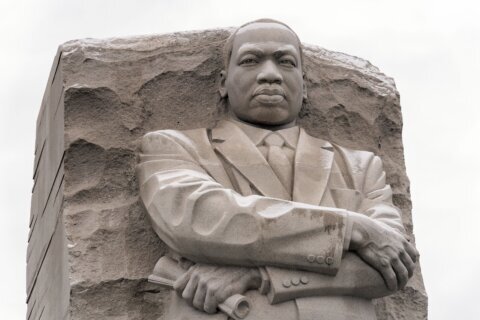As COVID-19 cases climb in the U.S., holiday travelers are looking for guidance on how to celebrate the season without catching or spreading the virus.
The Centers for Disease Control and Prevention has guidance on how to ensure your family can count on you to be home for the holidays.
Here’s what the CDC says about how and whether to travel this season:
- Q:
What are some good general tips for traveling during the pandemic?
- A:
- Pack hand sanitizer and wash your hands often.
- Outdoors is ideal. Wear a mask indoors, even if you’re vaccinated.
- Avoid crowds, as well as spaces with poor ventilation.
- If you feel sick, don’t host or attend gatherings.
- Get tested before travel if you have cause for concern such as symptoms or exposure when unvaccinated. A self-test could be used before going to indoor celebrations with people outside of your household.
- Q:
Can I travel if I’m unvaccinated?
- A:
The CDC recommends waiting to travel until you’re vaccinated because of how multiple generations of families tend to gather to celebrate. Also, most major airlines won’t let you travel without proof of vaccination.
If you decide to travel without being vaccinated, it’s recommended that you get a viral test done one to three days before your trip.
- Q:
What should I do before leaving for my trip?
- A:
- Check out the CDC’s data on COVID-19 transmission in your destination.
- Read up on your destination’s travel restrictions, including possible mask, quarantine, testing or vaccination requirements.
- Many airlines are requiring passengers to be vaccinated and to wear a mask, so make sure you know your airline’s policy.
- Q:
When should I wear a mask during travel?
- A:
If you aren’t vaccinated, wearing a mask is required in all public settings.
Even if you are vaccinated, the CDC wants you to wear a mask in public indoor settings.
This includes public transportation: trains, buses, planes, etc.
Vaccinated people don’t generally need to mask up in outdoor settings, unless they’re in close contact with unvaccinated people or in a crowded spot. So if you’re outside while waiting for your train to roll up, feel free to take your mask off for a breather.
- Q:
Are there times I should mask up or take extra precautions during my holiday celebration?
- A:
Even if you’re vaccinated, you might want to take extra precautions, such as wearing a mask if someone in your household has a weakened immune system or is unvaccinated.
For celebrations that involve people from different households, avoid crowds before travel, or take a COVID-19 test before celebrating to reduce the risk.
- Q:
When should people not travel?
- A:
According to CDC guidance: If you’re sick, stay home.
If you tested positive for COVID-19 and are still in isolation (even if you’re vaccinated), stay home.
If you’re waiting for a COVID-19 test result, stay home.
- Q:
Should young kids wear a mask?
- A:
Kids 2 and older should mask up in indoor public spaces if they aren’t vaccinated, or are fully vaccinated but in an area with substantial or high COVID-19 transmission (which is all of the U.S.) or have a weakened immune system.
- Q:
What should I do about traveling if I have a weakened immune system?
- A:
Even if you’ve had a booster shot, people with weakened immune systems are recommended to follow the same precautions for unvaccinated people — including wearing a mask.
- Q:
What should I do if I traveled and then get a positive COVID-19 result while at my destination?
- A:
People who test positive while visiting family should delay their travel home and isolate.
Depending on your companions’ exposure and vaccine status, they might need to self-quarantine, too.
The CDC said anyone who’s unvaccinated and has been up to 6 feet away from someone with COVID for at least 15 minutes should stay home for 14 days after their most recent contact with the person who tested positive.
If your travel companions are vaccinated, they don’t need to quarantine. They should get tested five to seven days after exposure.
But if your travel buddies are feeling sick, they should isolate.
- Q:
When should I get tested after getting home?
- A:
Vaccinated people should get tested if they develop symptoms and may be asked to quarantine depending on the state.
Unvaccinated people should get tested three to five days after returning home and stay home for seven days after their trip (even if that test comes back negative). If you don’t want to get tested, stay home and quarantine for 10 days after travel.
If you had COVID-19 in the past 90 days, there’s no need to get tested or quarantine. Contact a health care provider if you feel sick after getting home.








